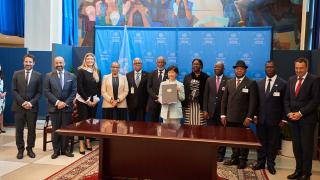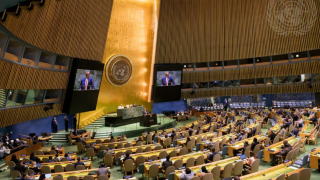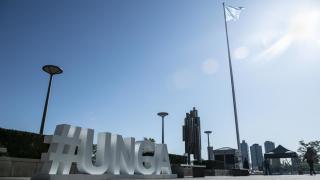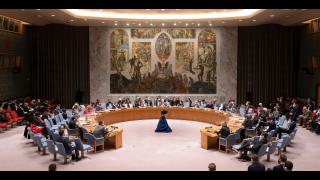
Part of our regular series of background briefings on the UN in the news.
A question we are asked regularly is what would happen to the United Kingdom’s permanent seat on the UN Security Council as a consequence of any given change to the UK’s status. The answer is, almost always, nothing. For example, the UK’s position on the Security Council is unaffected by Britain’s membership of the EU, other than in terms of political relationships. Permanent seats are robust institutions, and as the name would suggest the inhabitants are hard to dislodge. However, one of the most interesting such questions concerns what would happen if Scotland were to gain independence.
Would the UK lose its permanent seat if Scotland gained independence?
In short, almost certainly not.
All international agreements, such as those governing membership of the UN Security Council, relate to a nation as a legal entity. Even if that nation changes it name, has a part of it split off and declare independence, or undergoes a revolution or any other form of change of government, that nation is still considered to be the same legal entity. It is still bound by all the same laws and treaties as before and it still enjoys the same statuses as before. So, the UK would continue to hold its permanent seat.
This has happened many times in the past. When the UN was founded both Britain and France had vast empires, and in France’s case many parts of that empire, such as Algeria, were considered integral parts of the nation with the same legal status as any other French county or “department”. When sections of the British and French empire, including integral parts such as Algeria, declared independence it did not alter the status of Britain or France as legal entities and so their permanent seats at the Security Council were unaffected.
The only exception to this general rule would be if the United Kingdom were to be considered to no longer exist. When Czechoslovakia split into the Czech Republic and Slovakia neither half claimed to be the “continuing state” of Czechoslovakia. Instead it was considered that Czechoslovakia had ceased to exist and that two new legal entities had been created, both of which then had to join the UN as new countries.
Some have argued, that were Scotland to leave the UK, the UK would also cease to exist. The full name of the United Kingdom is the United Kingdom of Great Britain and Northern Ireland, and Great Britain is defined by the 1707 Act of Union as the Union of the Kingdoms of England and Scotland. There is far from a consensus on the issue, but Scotland’s independence might therefore be taken to mean the end of the United Kingdom.
If one were to take the view that after Scotland’s independence there would be no continuing state of the UK, and instead two new nations – separate legal entities – had been created, then neither new nation would be entitled to the UK’s permanent Security Council seat, and so the seat would in theory be lost.
Who decides?
All countries are “sovereign”, meaning that they alone can decide who and in what form they recognise other countries. Although there are some exceptions (such as Taiwan, Western Sahara and Palestine - our 2013 briefing on this last country provides some background) in general countries tend to gravitate towards a consensus, as international relations run more smoothly for all concerned when nations all recognise each other in the same way.
However, from the point of view of the UN, questions of who should be considered a continuing state of a previous entity are decided by the Security Council.
The Security Council would weigh up a number of factors: the position in international law, the desire on behalf of all countries not to set a precedent that could be used against them in the future, and other political considerations.
The best guide to how such a discussion would go comes from comparing two previous decisions, relating to Russia and Serbia.
When Yugoslavia broke up in 1992, Serbia tried to argue that it was the continuing state and should inherit Yugoslavia’s duties and privileges. The Security Council disagreed and determined that Yugoslavia had ceased to meaningfully exist. Thus Serbia could not be considered the continuing state and had to rejoin the UN as a new nation. However, when the USSR broke up in 1991 Russia successfully argued that it should be recognised as the continuing state and so it inherited, among other things, the USSR’s permanent seat on the Security Council.
The key difference between Russia and Serbia was that, while many former Yugoslav states strongly protested against Serbia being recognised as the continuing state, the Russian Government succeeded in receiving backing for its continued membership from all of the other former members of the USSR. This consensus among the newly seceding nations carried a lot of weight with the Security Council, who above all are looking to make a decision which maintains the stability of the political status quo, and cannot be used to call their own sovereignty into question.
What if things don’t go so smoothly?
It is in all countries best interests to avoid a bruising debate on the issue of recognition, but were that to happen the UK would itself be allowed to participate in the argument and to vote.
Art 27.3 of the UN Charter is very explicit in saying that Security Council member states can vote in debates even if they are parties to the dispute (with the peculiar exceptions of “Chapter VI” discussions and discussions under Art 52.3, both of which relate to the "peaceful settlement" of disputes and would not appear to apply). The UK would still have its seat, and its veto rights, until a decision to take it away was taken, and so in extremis, the UK could veto its own removal. The UK could even veto amendments to the UN Charter to prevent the rules being changed.
In fact, the only way to remove a permanent member of the Security Council against their will is in the manner that was used to replace the Republic of China (which controls Taiwan) with the People’s Republic of China (which controls mainland China) in 1971, which is to persuade two thirds of the UN General Assembly to suspend or expel a country from the UN entirely, or (as was done in China's case) to transfer the recognition of that country’s delegation to a different entity.
This is exceedingly unlikely to happen. However, were things to get close to that point it would represent a catastrophic failure of diplomacy which would be severely damaging to the continuing UK’s standing in the world. The government might well choose to surrender its seat before questions surrounding the continuing UK’s legitimacy reached this point; and if they did not then such extreme measures could not be ruled out entirely.
It would therefore be wise for the continuing UK to ward off trouble by securing support for its continued membership of the Security Council from the newly independent Scottish Government.
Is there any way Scotland could inherit the Security Council seat?
One of the more outlandish suggestions made in the aftermath of the vote to leave the European Union was that Scotland, Gibraltar and perhaps Northern Ireland would form a nation which would attempt to gain recognition as the continuing state of the UK and so inherit the UK's EU membership. The rest of the UK would then form a brand-new nation.
Were Scotland to gain widespread recognition as the continuing state of the UK then they would indeed inherit the UK’s Security Council seat. However, this is unlikely.
When a nation splits in two the most populous half is usually considered the continuing state and, while there are exceptions, they are rare and due to very specific historical, political and practical circumstances. In 1971 East and West Pakistan split: East Pakistan was more populous but even so it formed the new nation of Bangladesh and less-populous West Pakistan formed the continuing state of Pakistan. In 1947 when India declared independence from the British Empire, it had a larger population than the rest of the empire put together, but the idea that India be considered the continuing state was never seriously raised. In both cases this was in a large part due to the fact that the more populous state had less political and economic clout, and was the part that declared independence, and so they were the part that was seen as splitting away.
The likely reaction of the international community to an attempt to have Scotland recognised as the continuing state would be hostile, as such an unorthodox move would risk calling into question fundamental principles upon which states rely for their own legitimacy. If the rest of the United Kingdom were to support Scotland’s claim, or if the rest of the United Kingdom were to disintegrate fully at the same time, it might be possible, but a more likely outcome would be that no country would be recognised as the continuing state in such circumstances.
So what would happen to Scotland?
Scotland would have to apply to join the United Nations as a newly independent state. Procedurally, this is a fairly straightforward process. You make an application to the Secretary-General who forwards it to the Security Council, which votes on it. If it passes it is then passed on to the General Assembly where it needs a two-thirds majority to pass. Where, as in the case of South Sudan, independence was not particularly contentious, most states are minded to vote in favour of recognition with little fuss. However, ongoing debates around the recognition of Kosovo and Palestine demonstrate that where member states have deep seated political or principled objections to the country’s independence then the process can be much slower.
Once accepted as a member Scotland would be able to fight elections for a non-permanent seat on the Security Council, but could never become a permanent member.
What about if Wales, Northern Ireland, Cornwall or another part of the UK declares independence?
An independent Northern Ireland could raise similar questions to an independent Scotland, particularly as the name of the nation is the “United Kingdom of Great Britain and Northern Ireland”. However, the name of a nation is not fundamental to its legal identity, and in view of Northern Ireland’s small size Great Britain would be very likely to be recognised as the continuing state and retain the Security Council seat with little fuss. If Northern Ireland were to join the Republic of Ireland in a unified Ireland then that would likely be considered a matter of national boundaries shifting, rather than a change in the legal status of the nation, and so the status of Great Britain as the continuing state would be even more secure.
Given that they are smaller and less integrally bound to the definition of the nation, the UK’s position as the continuing state would be even more likely to be accepted without challenge if Wales, Cornwall or any other part of the UK were to leave.
Could Scotland or Wales become UN members in their own right without securing independence?
This question occasionally comes up in connection with Plaid Cymru, who have a policy of supporting Welsh Independence and also have a policy of supporting Welsh membership of the UN. It is not clear that you have to be a fully independent nation to be a full member of the UN, and indeed between 1945 and 1991 both Belarus and Ukraine had full UN membership despite being sub-national parts of a different full member: the USSR (India and the Philippines were also - founder - UN members about a year before gaining independence, although this was largely a matter of timing).
However, Belarus and Ukraine benefitted from the enthusiastic support of the USSR, and also from having been represented at the very first conferences that predated the foundation of the UN and so were in some senses grandfathered in. So while, in principle, a non-independent nation could send in an application in the same manner as a newly independent nation, in practice far too many countries would be worried about setting a new precedent, and so would be certain to vote against.
So is the UK’s seat on the Security Council safe then?
The UK is in a strong position legally and politically to defend its Security Council seat. Any exceptional scenarios outlined above are just that: exceptional. That said, any reduction in the UK's status, and in particular a significant loss of political and economic power such as would result from Scottish independence, would be likely to increase the already growing demands for reform of the Security Council. Such reform would be a slow process, requiring the consent of pemanent members (indluding the UK, of course) and the agreement of two-thirds of General Assembly members to amend the UN Charter. There is already overwhelming agreement on the need to reform the Council to better reflect today's increasingly multipolar world. The stumbling block is that there is nothing near consensus on what a reformed Council might look like. If current permanent members are perceived to be declining in power, this might spur action.
In the long term the best way for the UK to retain both its seat and its wider position on the global stage is to make sure that it does not take its position for granted and instead work to constantly earn its place on the Council. UNA-UK has consistently made that message the focus of our advocacy with the British Government, most recently through our Keeping Britain Global campaign.
Photo: Troops from the Black Watch 3rd Battalion, The Royal Regiment of Scotland (3 SCOTS) on deplyment in Cyprus. UN Cyprus






